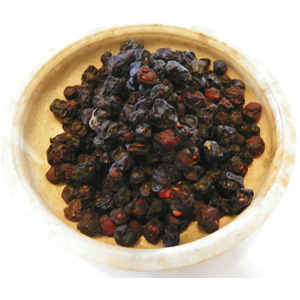Schisandra Schisandra chinensis

Schisandra berries
- Common Names
- Schisandra , Magnolia vine, wu-wei-zi, Schizandra
- Botanical Name
- Schisandra chinensis
- Family
- Schisandraceae
Medicinal Uses & Benefits of Schisandra
![]() How to Use|
Side Effects |
Plant & Garden|
How to Use|
Side Effects |
Plant & Garden|
- Medicinal Uses: * Chinese
* Chinese
* Congestion
* Cough
* Fatigue
* IBS
* Liver
* Longevity Tonics
- Properties: * Adaptogens * Antibacterial * Antitussive * Hypoglycemic * Vasodilator
- Parts Used: fruit
- Constituents: lignans: schizandrin, deoxyschizandrin, gomisins, and pregomisin
How to Use: Schisandra
Schisandra is a well known in Chinese medicine as one of the adaptogenic herbs that help to improve mental function, reduce tiredness and improve endurance. Use the berries as a tea, extracts, or supplement with schisandra capsules as a long term tonic for chronic fatigue. Schisandra is also a well recognized lung tonic and is used in cough syrups and to help improve breathing.
Schisandra fruit is widely used as a male tonic and adaptogenic in China. The Chinese name, wu-wei-zi, means five taste fruits. Schisandra has an usually sour, sweet, bitter, warm, and salty taste,as such the herb considered balanced in TCM by virtue of this distribution of flavors.1
Schisandra is believed to have an adaptogenic function to increase non-resistant immune response, and may help enhance vision. Alcohol extracts of Schisandra have helped to regenerate liver tissue, and thus have been used clinically in China for infectious hepatitis.2
Preparation Methods & Dosage :Teas, extracts, capsules. Let the berries infuse in dark fruit juice or glycerin for an easy, sweet tasting tonic.
Schisandra Remedies
Schisandra fruit is widely used as a male tonic and adaptogenic in China. The Chinese name, wu-wei-zi, means five taste fruits. Schisandra has an usually sour, sweet, bitter, warm, and salty taste,as such the herb considered balanced in TCM by virtue of this distribution of flavors.
Schisandra Side Effects: Schisandra might cause gastrointestinal upset in some individuals. Not for use during pregnancy.
Plant Description
Schisandra, also known as Magnolia vine is found as a rare ornamental vine in Western gardens, grown for the effect of the bright green leaves and brilliant scarlet fruits the vine produces in autumn.
Regional Traditions :Traditional Chinese Medicine *
- Mountain Rose Herbs
- Foster,Steven, Yue chongxi. "Herbal Emissaries: Bringing Chinese Herbs to the West", Healing Arts Press (1992)













